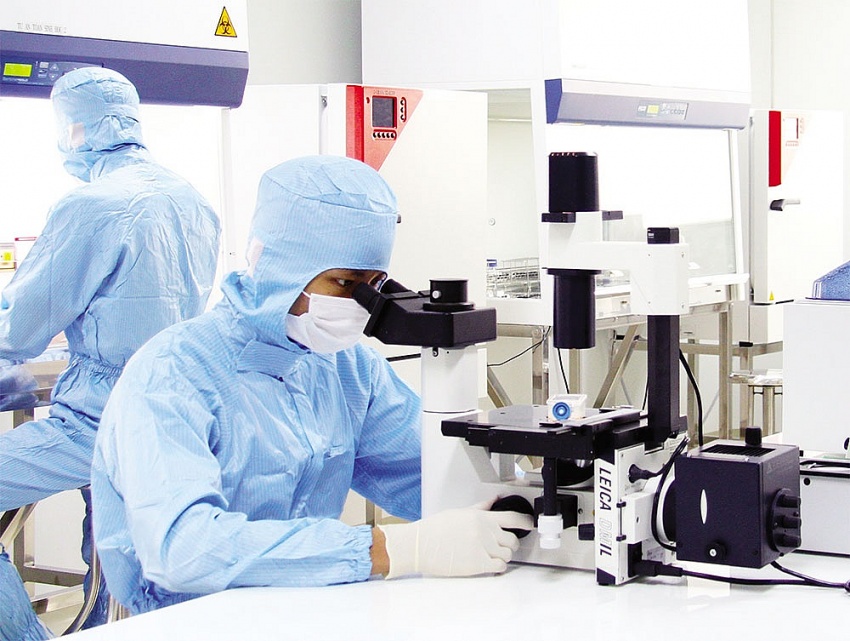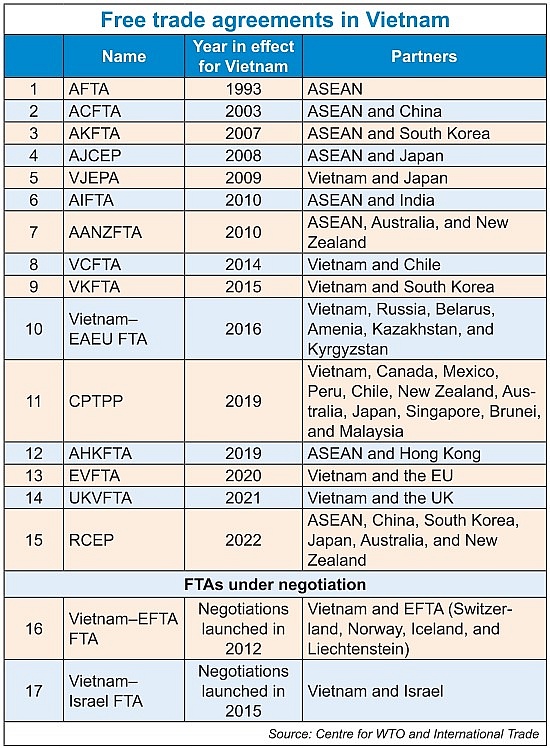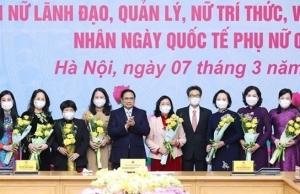Integration at the heart of economic wins
Coming to Vietnam to work as the new Israeli Ambassador to Vietnam a few weeks ago, Yaron Mayer considers boosting bilateral trade and investment ties one of the prime priorities in his tenure.
At a meeting on August 10 between Mayer and Vietnamese State President Nguyen Xuan Phuc, the Israeli diplomat said he will “combine with Vietnamese authorised agencies to boost the signing of the Vietnam-Israel Free Trade Agreement (VIFTA) which will help both nations expand bilateral ties in trade and investment.”
Two-way trade hit about $2 billion last year, up 20 per cent on-year, and the figure is set to be $10 billion when the VIFTA will become valid. The figure hit $1.14 billion in the first half of 2022, up 55 per cent on-year.
The deal, expected to be signed next year when both nations celebrate 30 years of diplomatic ties, saw the seventh round of negotiations concluded three weeks ago.
 |
| Investors are asked to offer support for production in order to fulfil orders and maintain supply chains, Le Toan |
In this round, discussions were focused on opening the market, customs and trade facilitation, government procurement, services, investment, and other legal and institutional issues. Both sides agreed on many important contents, especially those related to opening markets to each other.
Negotiators committed to accelerating discussions in the coming months to soon end the negotiating process, which began in late 2015.
When the VIFTA takes effect, it will be the 16th FTA that Vietnam has signed with bilateral and multilateral partners, helping further deepen the country’s international economic integration process.
Integration journey
Vietnam’s international integration policy was initiated by President Ho Chi Minh when the Democratic Republic of Vietnam was founded in 1945.
His prominent viewpoint on international integration was “to befriend all the democratic countries and harbour no grudge against anyone”, reflecting the ideas of peace, friendship, and mutual benefit.
Such ideology was clearly reflected in his letter to the United Nations in December 1946: “Vietnam is ready to exercise its open-door and cooperation policy in all fields: Vietnam creates all favourable conditions for foreign capitalists and technicians, and all of their technologies to receive their investment; Vietnam is ready to open wide its seaports, airports, and roads for trade and international transiting; Vietnam accepts to join all international economic cooperation organisations under the leadership of the United Nations.”
Vietnam’s international economic integration policy received a major boost in 1988 when the nation promulgated its Law on Foreign Investment in Vietnam, and in 1996 when the policy was reaffirmed at the eighth National Party Congress.
Over the recent decades, the doi moi policy has been the core strategy of Vietnam, in line with structural reforms, aiming at economic growth and sustainable development. In 1991, Vietnam became an official observer in 1992 and a member of ASEAN in 1995. It was also a co-founder of the ASEAN Regional Forum in 1994 and the Asia-Europe Meeting in 1996. In 2007, it became the 150th member of the World Trade Organization (WTO).
In terms of FTAs, Vietnam has been actively engaging further in bilateral and regional trade deals with major economies (see table). Besides the VIFTA, Vietnam has also been negotiating an FTA with the European Free Trade Association (EFTA) which includes Switzerland, Norway, Iceland, and Liechtenstein.
Meanwhile, Vietnam and other regional nations have vowed to liberalise trade and investment under the ASEAN Economic Community. According to commitments of the ASEAN Trade in Goods Agreement, ASEAN members committed to removing tariffs to 98.6 per cent of the total goods and products in 2021. Brunei, Indonesia, Malaysia, Philippines, Singapore, and Malaysia have eliminated 99.3 per cent of the tariffs and the remaining four (Cambodia, Laos, Myanmar, and Vietnam), 97.7 per cent.
According to the Ministry of Industry and Trade, the FTAs are greatly benefiting businesses in Vietnam via trade liberalisation. For example, under the Vietnam-South Korea FTA, Vietnam will completely remove its import duties on 89.9 per cent of all products from South Korea over a 15-year period following its implementation. Meanwhile, South Korea will do the same on 95.4 per cent of over 12,000 products imported from Vietnam.
In another case, the EU-Vietnam FTA will eliminate over 99 per cent of tariffs. In which, Vietnam will liberalise 48.5 per cent of import duties on EU exports to Vietnam at entry into force. Ten years later, 99 per cent of Vietnam’s duties will be removed. Meanwhile, 85.6 per cent of EU duties was erased as soon as the deal took effect in August 2021. After seven years, 99.2 per cent of EU duties will be removed.
 |
Great benefits
Thanks to international economic integration, Vietnam’s economy has increased 1.4 times in scale within five years, becoming the fourth-largest economy in ASEAN and ranking 37th worldwide.
Total trade turnover soared from $157.1 billion in 2010 to $668.5 billion last year. The figure hit $433.6 billion in this year’s first seven months, according to the General Department of Vietnam Customs.
After Vietnam’s accession to the WTO in 2007, an influx of foreign direct investment (FDI) flowed into Vietnam. In 2008 alone, the total FDI registered in Vietnam surged significantly against the previous period, at over $70 billion. However, due to the impacts of the global financial crisis, the disbursed amount in 2008 was only $11.5 billion – up 43.2 per cent from 2007.
The Ministry of Planning and Investment has reported that the total registered FDI into Vietnam reached more than $429 billion as of July 20. In the January-July 20 period, total registered capital hit $15.54 billion, with 7-month total disbursement sitting at $11.57 billion, up 10.2 per cent on-year.
“International economic integration has earned Vietnam much investment from overseas in recent decades. Foreign-invested enterprises have been providing jobs for over 4.5 million direct local labourers and millions of indirect labourers. They hold 23-25 per cent of total national development investment capital, and create over half of gross industry output while helping the country develop a modern financial and banking system,” said economic expert Nguyen Mai. “They also hold 70 per cent of the nation’s total export turnover, and are responsible for one-fifth of the state budget as well as one-fifth of GDP.”
In the World Investment Report 2022 by UNCTAD, Vietnam is also highlighted as a strong destination on the global investment map.
“International project finance announcements in industrial real estate have also grown continuously for several years, with no let-up during the pandemic. In 2021, deal numbers tripled to 152 projects with a value of $135 billion. Large projects include the construction of a steel and cement manufacturing plant in India for $14 billion and the construction of a 960-hectare pharmaceutical zone in Vietnam for $10 billion,” the report stated.
Prime Minister Pham Minh Chinh stated, “The stability and robust development of the Vietnamese economy offers numerous opportunities for investors worldwide. I call on investors to cooperate in safely resuming production to fulfil orders and maintain supply chains. I also kindly ask that you work closely with us in seizing the opportunities ushered in by the FTAs that Vietnam has signed, including high-quality FTAs with major partners.”
According to the Ministry of Foreign Affairs, one of Vietnam’s key targets in 2022 and 2023 is to soon complete negotiations of the VIFTA and the FTA between Vietnam and the EFTA in order to expand Vietnam’s trade partners worldwide.
Wishing to contribute to Vietnam’s efforts to expand international integration, Israeli Ambassador Mayer shared his first message, stating, “With the support of our partners in various fields in Vietnam, I aspire to forge greater cooperation in the fields of trade, agriculture, education, technology, and innovation, to name a few, for the benefit of the people of Vietnam and Israel.”
 | Prime Minister hails women's great contribution to national development, international integration Vietnamese women have demonstrated their capabilities and virtues in any situations and lines of work, greatly contributing to the national construction and development and international integration, Prime Minister Pham Minh Chinh has affirmed. |
 | Copyright cases rise in face of integration While copyright infringement has always been a serious global matter, the issue is even more complex in the fields of art, literature, and music – and in a young industry like Vietnam, content creators are struggling to navigate the intellectual property minefield while trying to catch up on the international stage. |
What the stars mean:
★ Poor ★ ★ Promising ★★★ Good ★★★★ Very good ★★★★★ Exceptional
 Tag:
Tag:
Related Contents
Latest News
More News
- Middle East tensions set to test VN-Index, boost energy stocks (March 02, 2026 | 17:15)
- Agency of Foreign Trade warns of trade disruption due to Middle East conflict (March 02, 2026 | 17:11)
- Spring Fair 2026 boosts domestic demand (March 02, 2026 | 16:30)
- Law on Investment takes effect (March 02, 2026 | 16:21)
- Ho Chi Minh City attracts nearly $980 million in FDI in early 2026 (March 02, 2026 | 10:57)
- Academic-policy network planned to support VIFC development (February 28, 2026 | 08:00)
- Businesses bouncing back after turbulent year (February 27, 2026 | 16:42)
- VinaCapital launches Vietnam's first two strategic-beta ETFs (February 26, 2026 | 09:00)
- PM sets five key tasks to accelerate sci-tech development (February 26, 2026 | 08:00)
- PM outlines new tasks for healthcare sector (February 25, 2026 | 16:00)

















 Mobile Version
Mobile Version